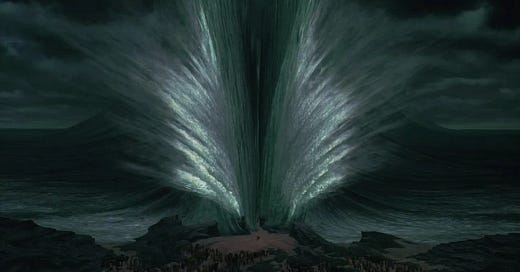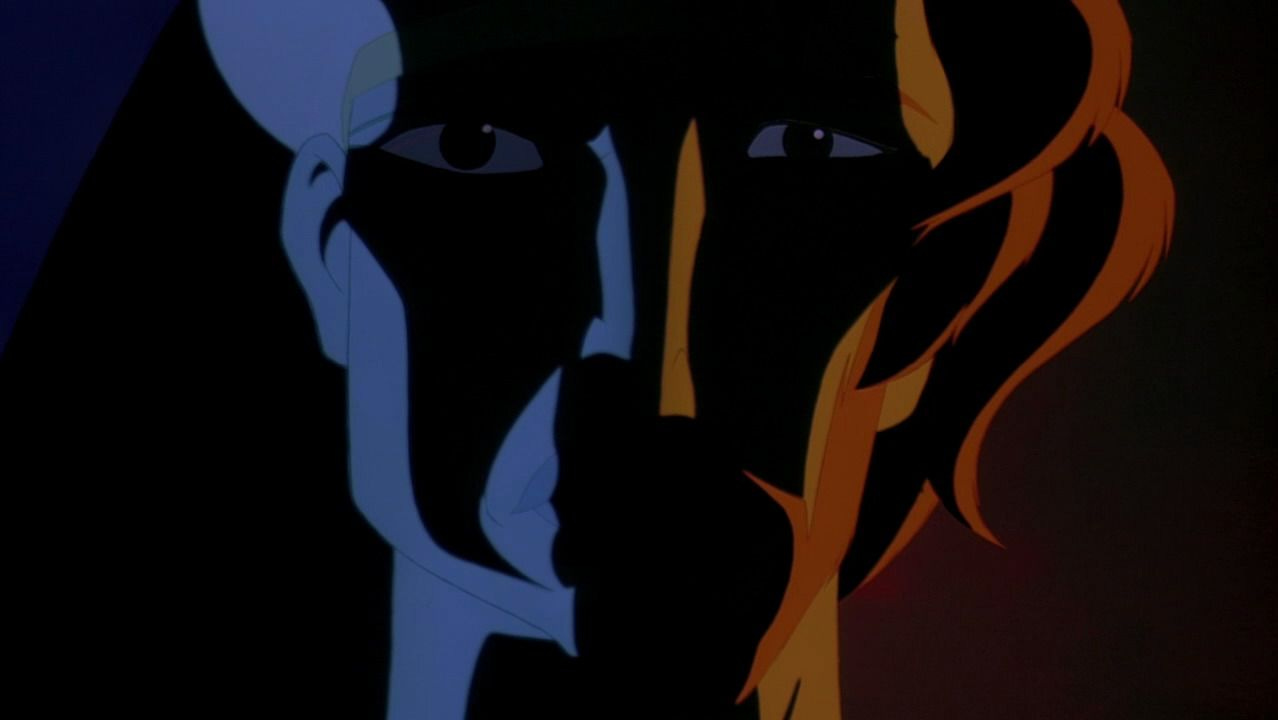100 Movies Every Catholic Should See #43: The Prince of Egypt (1998)
Directed by Brenda Chapman, Steve Hickner, and Simon Wells
It can hardly be a surprise to see this particular film on this particular list. As the list has progressed, there has been a variety of films represented: both family films and contemplative films. Action epics and religious dramas; intellectual journeys and feel-good productions.
The Prince of Egypt is the whole package.
But let's talk shop here - This movie came out 25 years ago - and it’s made waves. Budding studio DreamWorks decided to take a huge risk and make an animated Bible story: specifically the first 14 chapters of Exodus. In reflecting upon that particular book of the Bible there are precious few happy and lighthearted moments that come to mind. All told, the goal was a family-friendly animated movie about a dark and violent time in history, with a clear embrace of religion for mainstream media, and for good measure, a musical. On paper, this should not have worked. Disney said no: stating they would not compromise their commitment to avoid overtly religious themes (although they eventually would with Hunchback of Notre Dame). In no small part, this movie would be made in spite of Disney. And it was Simon Wells, Brenda Chapman, and Steve Hickner (the latter two in their directorial debut), who took the leap.
When it came down to it, the studio had one bulletproof vest that carried them through the choppy waters of development and production - and that was sheer dedication. They hired landscape artists. They consulted religious experts. They snagged a celebrity cast and Hans Zimmer. They got Stephen Schwartz and Mariah Carey and Whitney Houston to sing a duet for the end credits for goodness sake. They gathered their resources and came out swinging.
And pulled it off.
Take your staff, for with it you shall show my wonder
True, there is a disclaimer before the opening credits that admits some creative liberties, but it also emphasizes the studio’s firm resolve to tell the story as best they could. In the film It's Pharaoh's wife, and not his daughter, that finds and adopts Moses. In the film it is Moses, and not Aaron, that spearheads the talking and the miracles in his ministry. We could go on. But these decisions were made with the full knowledge that it was a deviation, in order to better serve the story they were trying to tell.
With that said, the movie starts with the infant Moses’ harrowing journey on the river into the eventual arms of his adopted mother, with the first strains of ‘Deliver Us' drawing out an emotional response for the first time viewer, the second time viewer, and the thousandth time viewer. It's no controversial statement to say that this is some of the most powerful music put to animation. As is usually the case when Hans Zimmer is around, the music drives the emotional impact into the stratosphere. Feelings will be felt. Moses’ mother is voiced by Israeli singer Ofra Haza, who the studio found so striking that they modeled the character after her. Her haunting, pained lullaby as she sends her baby into an uncertain future pierces through the grunts of pain and despair that build the chorus of Hebrew slaves in the background.
Would that there was article space to walk through the whole movie and speak to all the wonderful, intricate details that deserve a spotlight, but brevity is key. I doubt there exists many who have never seen this film and even fewer who would argue its place in this list.
So what is it exactly that secures this film a spot in the 100?
Could it be the voice acting?
A truly star-studded cast does help, and Val Kilmer, Ralph Fiennes, Sandra Bullock, Michelle Pfeiffer, Patrick Stewart, Daniel Glover, Helen Mirren, Martin Short, Steve Martin, and Jeff Goldblum are frankly wonderful in their respective roles. DreamWorks knew that they were taking a risk by animating a Bible story, and went for a heavily established and popular cast to help build some momentum around the project. This paid off spectacularly.
Could it be the character studies?
Each character was assigned a dedicated team to focus solely on appearance, dialogue, and expression. This team worked closely with the voice actors and artists to achieve a cohesive understanding and developmental arc that made sense for the character and for the story
Pharaoh Seti, the father figure to Moses and Rameses, is played by the ever-stately Sir Patrick Stewart. He brings a gravelly gravitas to the role, a pharaoh that feels a weight for the Hebrew boys he killed - a pharaoh who feels the pressure of difficult decisions made “for the greater good”. In one of the many visually stunning shots in the film, Seti chastises both young men about the weight of responsibility and leadership, his posture and demeanor perfectly mirroring the unforgiving sphinx in the background. Moses looks away, while Rameses puffs his chest to match the posture of the Pharaoh.
Moses is flawed: He starts off reckless and spoiled, his ignorance of the plight of the Hebrews exacerbated by his unwillingness to take responsibility for anything. Even then, some moments of genuine kindness slip through, hinting to the audience that he is meant for something more. After he is renewed in purpose by God Himself, he still struggles with his vocation of leader and spiritual father to his people. His love for his adopted brother causes him intense suffering, but it cannot interfere with what he has been called to do. Moses watches with solemn, haunted eyes as plague after plague slams against the home and life he once deeply loved, and spares a moment to collapse in compassionate weeping after the final plague kills the Pharaoh's son, a boy that, in another life, Moses would have doted upon as a beloved nephew.
Rameses is conflicted. The wonderfully versatile Ralph Fiennes captures the humanity within the stone-hearted Pharoah. This Rameses feels betrayed and abandoned by the brother he loved. This Rameses is desperate to not be the weak link in the glorious line of his people. This Rameses is deeply hurt that Moses returned for slaves, but not for him. There is a wealth of emotion and human vulnerability that hides in just one lyric line of the epic brother vs brother song Plagues:
You who I called brother, how could you have come to hate me so? Is this what you wanted?
The arcs of Moses and Rameses are present in the way their voices become harder, more mature, more immovable, as the film progresses. They start as two brothers, two best friends, sliding through sand. Movable, changeable, shifting sand. Their futures become locked in in two very different forms of leadership, the sand cementing into stone. Moses takes up his staff, Rameses takes up his scepter, and history is forever changed.
Even beyond the story and characters, the movie is visually incredible. The colors are deeply intense, and the artistic elements are intentional and intricate. The Egyptians are depicted with angular features, reminiscent of hieroglyphics, adding just one to the many elements of clever visual storytelling. The animation far surpasses expectations, with CGI emphasizing the beauty rather than overtaking it.
The inspiration for this film, the 1952 Charlton Heston The Ten Commandments, made history in its own right with its Red Sea parting, but this one? A worthy successor. An unforgettable cinematic triumph. This one makes you feel the hesitation, the closed-in breathless journey, the sheer scope of the miracle with every step.
While perusing social media, I saw a post featuring a brief clip of the epic brother vs brother Plague song. To find the general consensus of the film, I did a onceover of the comments, and was pleasantly surprised by the unanimous positive response. Nearly all the comments followed a general convention of :
“I am (insert religion or lack thereof) and this movie is a masterpiece.”
Dozens of religions were represented. And all united in the admiration and nostalgic love for an animated Bible story that had no business going as hard as it did. Comments also bounced around fun facts quite similar to “Did you know Viggo Mortenson actually broke his toe when he kicked that helmet?”
‘Did you know they brought on a team of 600 religious experts for this movie?’
Did you know Moses’s mother learned “Deliver Us” in 17 languages so she could sing for the dubs?
‘Did you know the voice actors were interacting and blocking in real time and space and that’s why the dialogue sounds so natural?
“Did you know that after the end credits they list a passage about Moses from the New Testament, the Torah, and the Quran?”
“Did you know that the whole cast is actually whispering the voice of God with Val Kilmer’s voice on the forefront? You have to listen real close!”
It's pretty easy to see why The Prince of Egypt belongs in this list of 100 movies. It's universally considered a cinematic triumph, the soundtrack would make a statue cry, and it’s biblically sound, and it’s beautiful. Is that not enough to be a shoo-in on this list?
Yes, but my approach lies in those Instagram comments. The variety of commenters was considerable- Jewish, several denominations of Christianity, Muslim, atheist, agnostic, pagan, etc., and they all loved it. They all spoke of the movie with fondness and admiration. DreamWorks, of all things, planted fields and fields of seeds of evangelization with this movie.
This film is an approachable, powerful, unapologetically good religious movie. It's not sickly sweet, it’s not hitting you over the head with cries to convert- but it does suck you in, mesmerize you with one of the best stories ever put into film, and then leave you to play the soundtrack on repeat for a solid week after.
It's the proverbial foot in the door for anyone who doesn't know where to start on religious movies. It's a source of common ground for the three major religions on this earth, and it's a conversation starter for anyone who appreciates cinema, music, history, and art. (The hieroglyphic dream sequence alone hits on every single one of these points in a manner I can only describe as jaw-dropping)
So run, don’t walk, and rewatch Prince of Egypt. A milestone in cinematic endeavors, DreamWorks’ self-proclaimed magnum opus, and undoubtedly a movie every Catholic should see.
THUS SAITH THE LORD









One of my top 10 favorite movies